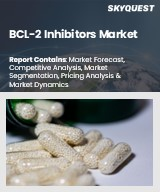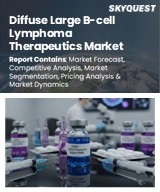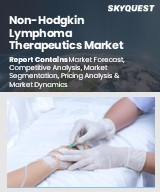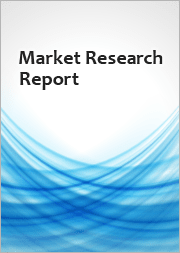
|
시장보고서
상품코드
1708185
림프종 치료 시장 기회, 성장 촉진요인, 산업 동향 분석 및 예측(2025-2034년)Lymphoma Treatment Market Opportunity, Growth Drivers, Industry Trend Analysis, and Forecast 2025 - 2034 |
||||||
세계 림프종 치료 시장은 2024년 83억 달러에 달했고, 2025-2034년 8.4%의 연평균 복합 성장률(CAGR)을 나타낼 전망입니다.
림프종은 림프계에 영향을 미치는 암의 일종으로 백혈구의 일종인 림프구의 비정상적인 증식으로 발생합니다. 주로 림프절에 발현하며 다른 조직에도 영향을 미칠 수 있습니다. 비호지킨림프종과 호지킨림프종이 있으며, 호지킨림프종에서는 리드-스탠버그 세포의 존재로 구별됩니다. 림프절 부종, 발열, 피로, 피로, 식욕부진 등의 증상이 나타납니다. 호지킨림프종 발병률은 특히 젊은 연령층에서 여전히 높지만, 일부 지역에서는 의료 인프라가 부족하여 생존율이 낮습니다. 이러한 격차는 특히 저소득 지역에서의 치료 접근법 개선의 필요성을 강조하고 있습니다.

비호지킨림프종(NHL)은 높은 유병률과 다양한 아형으로 인해 전 세계적으로 많은 환자 수를 차지하며 시장을 지배하고 있습니다. 유병률 증가는 시장 성장을 지속적으로 견인하고 있습니다. 리툭시맙과 같은 단일클론항체 치료제는 림프종 치료에 혁명을 일으켰습니다. 리툭시맙은 B 림프구의 CD20 분자를 표적으로 하며, 비호지킨림프종과 결절성 림프구 우세형 호지킨림프종(NLPHL) 모두에 효과가 있는 것으로 입증되었습니다. 이 치료법은 반응률을 높이고, 관해 기간을 연장하며, 생존율을 향상시켜 림프종 치료의 핵심으로 자리매김하고 있습니다.
| 시장 범위 | |
|---|---|
| 시작 연도 | 2024년 |
| 예측 연도 | 2025-2034년 |
| 시작 금액 | 83억 달러 |
| 예상 금액 | 183억 달러 |
| CAGR | 8.4% |
비경구 투여는 2024년 시장 점유율의 78.7%를 차지하며 우위를 점했습니다. 혈류에 직접 약물을 주입하는 이 방법은 약물의 흡수가 빠르고 빠른 치료가 필요한 침습성 림프종에 가장 적합합니다. 비경구 투여는 면역 요법, CAR T 세포 요법, 대량 화학 요법과 같은 고급 치료에 중요한 정확한 투여와 제어된 전달을 가능하게 합니다. 심각한 증상이나 장 문제로 인해 경구용 약물을 복용할 수 없는 환자에게는 이 접근법이 효과적입니다. 또한, 비경구 투여는 경구 치료에 반응하지 않는 재발성 또는 난치성 림프종 환자에게 여전히 선호되는 방법입니다.
병원 약국은 화학요법, 면역요법, CAR T 세포 요법 등 병원 투여 요법이 널리 사용되는 것을 배경으로 2024년 45.9%로 가장 큰 시장 점유율을 차지했습니다. 이러한 특수 치료는 세심한 준비와 모니터링이 필요하며, 병원 내 치료가 가장 적합합니다. 병원 약국은 여전히 이러한 맞춤형 의약품과 고가의 생물학적 제제의 주요 공급원이 되고 있습니다. 전문 종양 치료를 위해 입원하는 환자 수가 증가함에 따라 이 부문 시장 점유율이 더욱 증가하고 있습니다.
영국에서 림프종 치료 시장은 2025년부터 2034년까지 안정적인 성장세를 보일 것으로 예측됩니다. 이 지역에서는 림프종 유병률이 증가하고 있으며, 혁신적인 치료 솔루션에 대한 수요가 증가하고 있습니다. 정밀의료, 면역치료, CAR T 세포 치료의 발전은 이러한 수요에 부응하고 있습니다. 또한, 생명과학 산업 전략과 브렉시트 이후 권한 위임과 같은 이니셔티브는 영국의 혁신 역량과 국내 치료제 생산 능력을 강화하여 이 지역 전체 시장의 성장을 가속하고 있습니다.
목차
제1장 조사 방법과 조사 범위
제2장 주요 요약
제3장 업계 인사이트
- 생태계 분석
- 업계에 대한 영향요인
- 성장 촉진요인
- 업계의 잠재적 리스크&과제
- 성장 가능성 분석
- 규제 상황
- 기술적 전망
- 향후 시장 동향
- 갭 분석
- Porter's Five Forces 분석
- PESTEL 분석
제4장 경쟁 구도
- 서론
- 기업 점유율 분석
- 기업 매트릭스 분석
- 주요 시장 기업 - 경쟁 분석
- 경쟁 포지셔닝 매트릭스
- 전략 대시보드
제5장 시장 추산 및 예측 : 유형별, 2021년-2034년
- 주요 동향
- 호지킨 림프종
- 비호지킨 림프종
제6장 시장 추산 및 예측 : 약제 유형별, 2021년-2034년
- 주요 동향
- Rituxan/MabThera
- Revlimid
- mbruvica
- Adcetris
- Keytruda
- Opdivo
- 기타 약제
제7장 시장 추산 및 예측 : 투여 경로별, 2021년-2034년
- 주요 동향
- 경구제
- 비경구제
제8장 시장 추산 및 예측 : 유통 채널별, 2021년-2034년
- 주요 동향
- 병원 약국
- 소매 약국
- 온라인 약국
제9장 시장 추산 및 예측 : 지역별, 2021년-2034년
- 주요 동향
- 북미
- 미국
- 캐나다
- 유럽
- 독일
- 영국
- 프랑스
- 스페인
- 이탈리아
- 네덜란드
- 아시아태평양
- 중국
- 인도
- 일본
- 호주
- 한국
- 라틴아메리카
- 브라질
- 멕시코
- 아르헨티나
- 중동 및 아프리카
- 사우디아라비아
- 남아프리카공화국
- 아랍에미리트(UAE)
제10장 기업 개요
- AstraZeneca
- Bayer
- Biogen
- BioGene
- Bristol-Myers Squibb
- Celgene
- Eli Lilly and Company
- F. Hoffmann-La Roche
- Gilead Sciences
- Incyte
- Johnson &Johnson
- Juno Therapeutics
- Merck
- Novartis
- Seattle Genetics
- Takeda Pharmaceutical
The Global Lymphoma Treatment Market reached USD 8.3 billion in 2024 and is projected to exhibit a CAGR of 8.4% from 2025 to 2034. Lymphoma, a type of cancer affecting the lymphatic system, arises from abnormal proliferation of lymphocytes, a form of white blood cell. It primarily manifests in lymph nodes and can also affect other tissues. There are two primary types non-Hodgkin lymphoma and Hodgkin lymphoma-distinguished by the presence of Reed-Sternberg cells in Hodgkin lymphoma. Symptoms often include lymphadenopathy, fever, fatigue, and appetite loss. The burden of Hodgkin lymphoma remains high, especially among young populations, while inadequate healthcare infrastructure in some regions contributes to lower survival rates. This disparity emphasizes the need for improved treatment approaches, particularly in low-income regions.
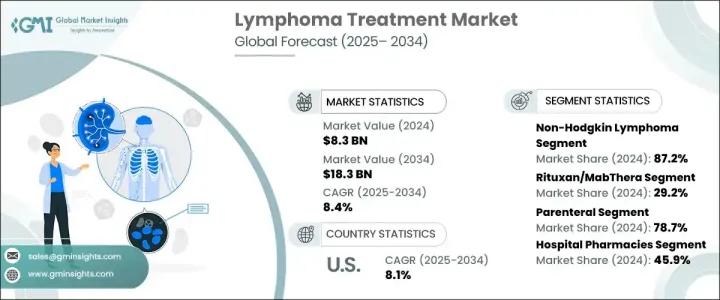
Non-Hodgkin lymphoma (NHL) dominates the market due to its higher prevalence and multiple subtypes, resulting in a larger patient population worldwide. Increasing incidence rates continue to propel the market's growth. The use of monoclonal antibody therapies, such as Rituximab, has revolutionized lymphoma treatment. Rituximab targets the CD20 molecule on B lymphocytes and has proven effective in managing both NHL and nodular lymphocyte predominant Hodgkin lymphoma (NLPHL). The therapy enhances response rates, prolongs remission duration, and boosts survival rates, reinforcing its position as a cornerstone in lymphoma treatment.
| Market Scope | |
|---|---|
| Start Year | 2024 |
| Forecast Year | 2025-2034 |
| Start Value | $8.3 Billion |
| Forecast Value | $18.3 Billion |
| CAGR | 8.4% |
Parenteral administration accounted for 78.7% of the market share in 2024, underscoring its dominance. This method, which involves injecting medication directly into the bloodstream, ensures rapid drug absorption, making it ideal for aggressive lymphomas requiring immediate intervention. Parenteral routes allow for precise dosing and controlled delivery, which is critical for advanced therapies such as immunotherapy, CAR T-cell therapy, and high-dose chemotherapy. Patients who are unable to tolerate oral medications due to severe symptoms or bowel issues benefit from this approach. Furthermore, parenteral administration remains the preferred method for relapsed or refractory lymphoma cases that do not respond well to oral treatments.
Hospital pharmacies held the largest market share at 45.9% in 2024, driven by the widespread use of hospital-administered therapies such as chemotherapy, immunotherapy, and CAR T-cell therapies. These specialized treatments require careful preparation and monitoring, which is best handled within a hospital setting. Hospital pharmacies remain the primary source for these tailored medications and high-cost biologics. The growing volume of hospital admissions for specialized oncology care further reinforces the segment's substantial market share.
In the United Kingdom, the lymphoma treatment market is expected to witness consistent growth between 2025 and 2034. The increasing prevalence of lymphoma in the region is driving demand for innovative treatment solutions. Advancements in precision medicine, immunotherapy, and CAR T-cell therapies are meeting this demand. Additionally, initiatives such as the Life Sciences Industrial Strategy and Brexit-driven devolution efforts are strengthening the UK's capacity to innovate and produce domestic treatments, boosting the region's overall market growth.
Table of Contents
Chapter 1 Methodology and Scope
- 1.1 Market scope and definitions
- 1.2 Research design
- 1.2.1 Research approach
- 1.2.2 Data collection methods
- 1.3 Base estimates and calculations
- 1.3.1 Base year calculation
- 1.3.2 Key trends for market estimation
- 1.4 Forecast model
- 1.5 Primary research and validation
- 1.5.1 Primary sources
- 1.5.2 Data mining sources
Chapter 2 Executive Summary
- 2.1 Industry 360° synopsis
Chapter 3 Industry Insights
- 3.1 Industry ecosystem analysis
- 3.2 Industry impact forces
- 3.2.1 Growth drivers
- 3.2.1.1 Increasing prevalence of lymphoma
- 3.2.1.2 Advancements in treatment options
- 3.2.1.3 Growing approval of novel targeted therapies
- 3.2.2 Industry pitfalls and challenges
- 3.2.2.1 High treatment costs
- 3.2.2.2 Delayed diagnosis
- 3.2.1 Growth drivers
- 3.3 Growth potential analysis
- 3.4 Regulatory landscape
- 3.5 Technological landscape
- 3.6 Future market trends
- 3.7 Gap analysis
- 3.8 Porter's analysis
- 3.9 PESTEL analysis
Chapter 4 Competitive Landscape, 2024
- 4.1 Introduction
- 4.2 Company market share analysis
- 4.3 Company matrix analysis
- 4.4 Competitive analysis of major market players
- 4.5 Competitive positioning matrix
- 4.6 Strategy dashboard
Chapter 5 Market Estimates and Forecast, By Type, 2021 – 2034 ($ Mn)
- 5.1 Key trends
- 5.2 Hodgkin lymphoma
- 5.3 Non-Hodgkin lymphoma
Chapter 6 Market Estimates and Forecast, By Drug Type, 2021 – 2034 ($ Mn)
- 6.1 Key trends
- 6.2 Rituxan/MabThera
- 6.3 Revlimid
- 6.4 Imbruvica
- 6.5 Adcetris
- 6.6 Keytruda
- 6.7 Opdivo
- 6.8 Other drug types
Chapter 7 Market Estimates and Forecast, By Route of Administration, 2021 – 2034 ($ Mn)
- 7.1 Key trends
- 7.2 Oral
- 7.3 Parenteral
Chapter 8 Market Estimates and Forecast, By Distribution Channel, 2021 – 2034 ($ Mn)
- 8.1 Key trends
- 8.2 Hospital pharmacies
- 8.3 Retail pharmacies
- 8.4 Online pharmacies
Chapter 9 Market Estimates and Forecast, By Region, 2021 – 2034 ($ Mn)
- 9.1 Key trends
- 9.2 North America
- 9.2.1 U.S.
- 9.2.2 Canada
- 9.3 Europe
- 9.3.1 Germany
- 9.3.2 UK
- 9.3.3 France
- 9.3.4 Spain
- 9.3.5 Italy
- 9.3.6 Netherlands
- 9.4 Asia Pacific
- 9.4.1 China
- 9.4.2 India
- 9.4.3 Japan
- 9.4.4 Australia
- 9.4.5 South Korea
- 9.5 Latin America
- 9.5.1 Brazil
- 9.5.2 Mexico
- 9.5.3 Argentina
- 9.6 Middle East and Africa
- 9.6.1 Saudi Arabia
- 9.6.2 South Africa
- 9.6.3 UAE
Chapter 10 Company Profiles
- 10.1 AstraZeneca
- 10.2 Bayer
- 10.3 Biogen
- 10.4 BioGene
- 10.5 Bristol-Myers Squibb
- 10.6 Celgene
- 10.7 Eli Lilly and Company
- 10.8 F. Hoffmann-La Roche
- 10.9 Gilead Sciences
- 10.10 Incyte
- 10.11 Johnson & Johnson
- 10.12 Juno Therapeutics
- 10.13 Merck
- 10.14 Novartis
- 10.15 Seattle Genetics
- 10.16 Takeda Pharmaceutical






